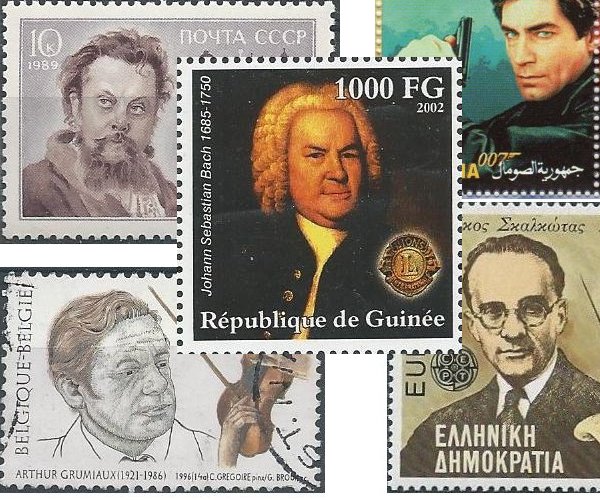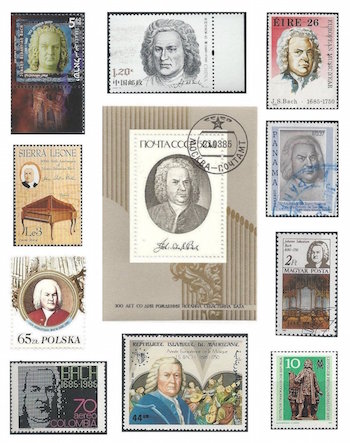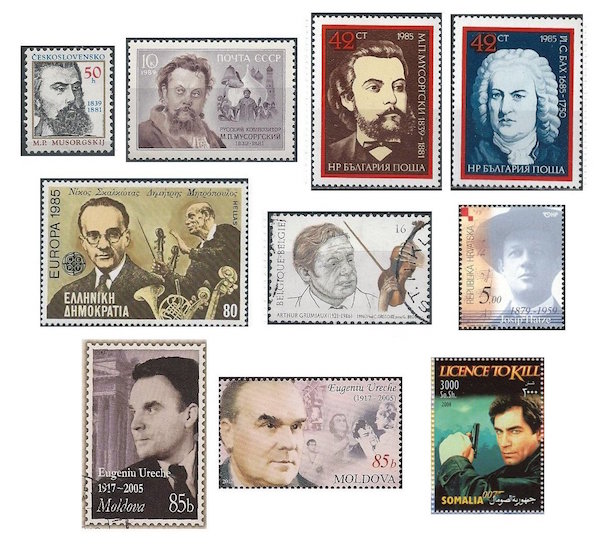The Arts on the Stamps of the World — March 21
An Arts Fuse regular feature: the arts on stamps of the world.

By Doug Briscoe
Our presentation today is devoted almost entirely to music people, with Johann Sebastian Bach topping the list and Modest Mussorgsky running second (even though today is the 100th anniversary of the birth of the multitalented Eugeniu Ureche). And Nikos Skalkottas and Arthur Grumiaux ain’t chopped liver, either.

The birthday of Johann Sebastian Bach has traditionally been observed on 21 March, but that’s according to the Old Style Julian calendar. Corrected for inflation, his date of birth would be 31 March (the same day as Haydn!). I offer just a sample of the many Bach stamps. At center is a handsome mini-sheet issued by the Soviet Union for the tricentenary in 1985. Clockwise from upper left, we have a lovely Israeli design from 2000; a stamp from China, part of a 2010 composers set; an Irish tricentenary issue; a Panamanian stamp dated 1977; and the rest—all 300th anniversary stamps—come from Hungary, East Germany, Mauritania, Colombia, Poland, and Sierra Leone.
The second image is given over to our other birthday people. Modest (mud-YEST) Mussorgsky (21 March [O.S. 9 March] 1839 – 28 March [O.S. 16 March] 1881), composer of Pictures at an Exhibition and Night on Bald Mountain, is represented here with three stamps. The leftmost pair (from Czechoslovakia and Russia) were both issued in the centennial year of his death, 1981; the one on the right appeared as part of a 1985 Bulgarian set of six stamps honoring different composers. That same set also included a Bach stamp, which I oh-so aptly juxtapose.
Today is also the birthday of the gifted Greek composer Nikos Skalkottas (21 March [OS 8 March 1904 – 19 September 1949), who is shown on this Greek stamp with his compatriot the great conductor Dmitri Mitropoulos (whose birthday was March 1st). Skalkottas’s teachers included Willy Hess, Paul Juon, Kurt Weill, and Philipp Jarnach, and he took masterclasses with Schoenberg from 1927 to 1932. Plagued with poverty and the public’s incomprehension of his music, he seems to have suffered a nervous breakdown in 1933. He was interned for some months during the German occupation of Greece and some years later died, probably of a neglected hernia, at the age of 45.
Next comes a Belgian stamp from 1996 honoring one of my favorite violinists, Arthur Grumiaux (21 March 1921 – 16 October 1986). A child prodigy, he declined to perform publicly during the war, giving his first post-war performance with the Allied Entertainments National Service Association in 1945. His first US appearance took place here in Boston in 1951. He was made Baron Grumiaux by King Baudouin in 1973. I find his Mozart playing particularly idiomatic and love his recordings of the duos and Sinfonia Concertante (all with violist Arrigo Pelliccia), the concertos, and string quintets. The Voyager spacecraft carries his recording of the Gavotte from the Bach Partita #3. Two years ago, the Bravo Competition, held in Namur, Belgium since 2008, was renamed the Concours International Grumiaux pour Jeunes Violonistes (International Grumiaux Competition for Young Violinists).
Croatian composer and choral conductor Josip Hatze (21 March 1879 – 30 January 1959) wrote a well-received Croatian Mass while still in his teens, before study in Pesaro with Mascagni. He took up choral conducting, served in the First World War (his wife died of the Spanish flu while he was at the front in Albania), and during the Second joined the resistance and was then a refugee (he formed a camp choir in Egypt). He wrote mostly vocal music: two operas, cantatas, songs.

Some sources say that Eugeniu Ureche was born on 20 March 1917 in Belarus, others give his birthdate as March 21 and his birthplace as a village in Moldova. In any case, he was a versatile performer: actor, director, set designer, and singer of folk songs, opera, and operetta. As an operatic basso he sang Sparafucile, Mephistopheles, and Ramfis, as well as works from the Russian repertoire. He died on Mozart’s birthday, 27 January, in the year 2005. Moldova has issued both a postal envelope (2007) and a stamp (2012) in his memory.
Odd man out in today’s otherwise all-musician program is British actor Timothy Dalton, born on this day in 1946 (according to most sources, with a couple of others saying 1944). He is probably best known for playing 007 in two Bond flicks, The Living Daylights (1987) and Licence to Kill (1989), but I’ll never forget him as Philip II in the wonderful 1968 film of The Lion in Winter (his first movie!), and he was also memorable, I thought, as the long-suffering Sir Malcolm Murray in the recent Showtime series Penny Dreadful.
I’m surprised that there’s apparently no stamp for the influential German Romantic writer who used the pen name “Jean Paul” (born Johann Paul Friedrich Richter; 21 March 1763 – 14 November 1825).
A graduate of the University of Massachusetts with a B.A. in English, Doug Briscoe worked in Boston classical music radio, at WCRB, WGBH, and WBUR, for about 25 years, beginning in 1977. He has the curious distinction of having succeeded Robert J. Lurtsema twice, first as host of WGBH’s weekday morning classical music program in 1993, then as host of the weekend program when Robert J.’s health failed in 2000. Doug also wrote liner notes for several of the late Gunther Schuller’s GM Recordings releases as well as program notes for the Boston Classical Orchestra. For the past few years he’s been posting a Facebook “blog” of classical music on stamps of the world, which has now been expanded to encompass all the arts for The Arts Fuse.
